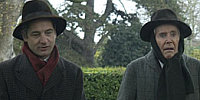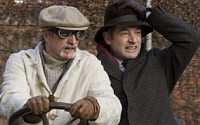 On reincarnation, dogs and dads
On reincarnation, dogs and dadsJeremy Northam and Toa Fraser talk about working with Peter O’Toole and Sam Neill’s life as a dog
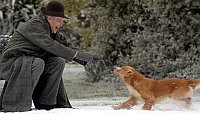
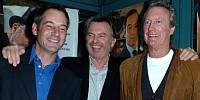
At the premiere in London: Jeremy Northam with costars Sam Neill and Bryan Brown (above); director Toa Fraser with Peter O'Toole (below)
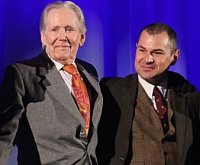
 Dean Spanley is an unusually offbeat British period movie, not least because it's directed by a Kiwi. But Toa Fraser knew exactly what he was doing, and gathered a remarkably strong cast to tell the story of a preacher who just might have been a dog in his previous life. The lead role went to Jeremy Northam, who sinks back in his seat at Soho House on a dark October afternoon and laughs when asked about going back in time yet again...
Dean Spanley is an unusually offbeat British period movie, not least because it's directed by a Kiwi. But Toa Fraser knew exactly what he was doing, and gathered a remarkably strong cast to tell the story of a preacher who just might have been a dog in his previous life. The lead role went to Jeremy Northam, who sinks back in his seat at Soho House on a dark October afternoon and laughs when asked about going back in time yet again...Jeremy: I'd be lying if I didn't say that my heart sank slightly as I read yet another period movie, having done so many and having said I wouldn't do any more. The frustration often times with period films is that you feel that somehow the periodness of the picture distorts the story from any kind of accessibility for a contemporary audience. However, it's my bread and butter, and this film uses the expectations of a British period movie against itself to some extent. It sets up nicely the idea of this festering relationship between the father and son.
But it's not overly serious about it.
Jeremy: There were elements of whimsy in the script from the start that sort of set alarm bells ringing. I hoped that the film wouldn't teeter that direction too much, but Toa was good from the start, making it clear that he wouldn't allow that to happen. There's a lot implied in the relationships and the past history of the family unit. And the more whimsical elements of the script are just the device to get to the nub of the matter. And it also was interesting to see a middle-aged man and his aged father. So often in those sorts of stories they'd be tempted to cut back to when he was a kid to explain it, or to cast a much younger bloke and tell the story from that point of view. But there's something about the fact that they've obviously both lived a bit, and parts of them have sort of died and given up hope. And I thought there was room to explore that. Relationships with parents become more complicated as time goes on, and not the other way round.
Toa: There are a lot of crazy elements in the film, but at the core of it is this really quite a heartfelt story of a family. And I thought that was really quite audacious of the script to drop that kind of surprise on you.
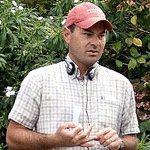
You could do a sort of Eddie Murphy Nutty Professor version of this movie!
Toa: Reincarnation is kind of the McGuffin of the story - the heart of the thing is the father-and-son story. And whether they believe in reincarnation doesn't really matter. My dad is from Fiji and in the Pacific these things are very common to us. We don't think twice about the fact that your auntie says that your grandmother turned up at a funeral in the form of a heron. And the only reason people dispute that is because they think it's your uncle not your grandmother. We live very much with that kind of strong Christian thing mixed with traditional spirituality.
Was it difficult to convince Sam Neill to play a dog?
Toa: Actually Sam was anxious about it - he turned it down three times. He was worried about both how he would do it and how it was going to be directed. I mean, you could do a sort of Eddie Murphy Nutty Professor version of this movie! And I think Sam was anxious to know that that's not what I was interested in doing, and that we were going to go for a subtler and lighter touch. But he sort of came to his own conclusions. He's got a very fond relationship with his own dog, a Staffordshire terrier I think. I don't know much about dogs - I'm allergic. But Sam studied his dog and decided how he could do it. I knew he was a funny, kind of light guy - and I'm not sure audiences were aware of that. They know his kind of buttoned-up characters that he's made his own. And I was looking forward to the opportunity to subvert that with something a bit more cool.
How did you do the dog sequences if you're allergic?
Toa: I took a lot of hay fever tablets! But it was fantastic in the sense that dogs have very strict working hours - even stricter than Peter O'Toole! After having spent six weeks in the north Norfolk winter, going back to New Zealand in the height of the summer was amazing, shooting in the countryside. And if the dogs were too tired, it meant we couldn't shoot anything. So we all had to sleep under a tree and wait for the dogs to be less tired. It was very reasonable way to make a movie.
But you were filming in Norfolk, Jeremy.
Jeremy: It was November through to mid-December in Norfolk - not the most salubrious time of the year for 5am starts. It felt a lot longer than the six weeks it took. I was familiar with the cold, damp winter. And as I went for my early morning runs I only had to dive into the hedgerows twice to avoid beet trucks hurtling in the other direction, and once to avoid Sam Neill and his driver going to work.
How do you stay in the moment when Sam Neill is sitting there doing dog noises?
Jeremy: It was brilliant. We were down for four days doing that one scene at the dinner party - four days of Sam talking. And of course you do break down laughing, and he got a fair amount of piss-taking, "Try and get your f***ing lines right!" All the support and encouragement that you would expect of professional actors.

I only had to dive into the hedgerows twice to avoid beet trucks
Toa: I didn't give anybody much direction - they were all incredibly prepared as you can imagine. When you look at the list of directors that these guys had worked with - Spielberg, David Lean, Bertolucci, Mamet, everybody - you could imagine that these guys have fairly strong arguments. We didn't rehearse at all before we got on set - we'd rehearse on set that morning. I guess Sam was the one I did the most talking to, but again it's just a matter of letting them do what they feel is right, and if I feel it's swerving away from my vision I have to get them back in line. He did a hell of a lot of thinking about his role and not a lot of talking about it. And he had a tonne of lines to learn - especially that 18-page scene, which is sort of the climax of the movie, built around his big monologue. It was like a Sam Neill one-man show.
What about Peter O'Toole?
Toa: I'd whisper one word in his ear, and that word would completely change his performance. It was a real joy to behold. And every time, regardless of whether he's acting like an arse or being the most charming character in the world, it's still an amazing performance.
Jeremy, how did you develop that distinct but distanced father-son relationship with him?
Jeremy: By not talking about it, I think. He didn't want to talk about what was happening in the scenes, he didn't want to rehearse beforehand. I certainly understood why, and was quite in agreement about it. So much of performing together is based, however fleetingly, on trust. You feel very exposed in front one another and it's sort of like doing this dance, naked, in front of potentially millions of people. It can be very exposing. And as you look at each other it's not very hard to imagine feeling as though the other person can look right into your very soul and spot whether you're lying or telling the truth. But there's also great comfort to be derived from that when people can just enjoy each others' company, relax and trust that they're being supported by the other person. And I think he felt that, and I certainly felt that.
And Toa, was it daunting to direct him in only your second film?
Toa: I fell in love with the guy. I can't say enough about the generosity of spirit that he brought to the set. I think partly because we had a really relaxed set and a really great group of actors that supported each other. I think he and I built up a level of trust really quickly. I do things in a kind of old fashioned way - I don't watch the monitor, I stand right next to the camera - and I think he appreciated that. I try to foster a working set that's quite theatrical: I laugh a lot and the crew is kind of the audience. And at the same time he was very generous to me. On second or third day he dragged me into his green room to give me a bit of advice that David Lean had given him, and I thought, "Oh s***!" But it was about lighting an actor's eyes. And Peter's eyes do a hell of a lot of talking.
SOHO HOUSE, LONDON, 16.Oct.08
HOME | REVIEWS | AWARDS | NEWS | FESTIVAL | Q&A | ABOUT | TALKBACK
